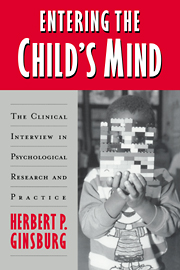Book contents
- Frontmatter
- Contents
- Preface
- Acknowledgments
- 1 The Need to Move Beyond Standardized Methods
- 2 What Is the Clinical Interview? Where Did It Come From? Why Do It?
- 3 What Happens in the Clinical Interview?
- 4 Not a Cookbook: Guidelines for Conducting a Clinical Interview
- 5 Evaluating Clinical Interviews: How Good Are They?
- 6 Toward the Future: The Clinical Interview and the Curriculum
- Appendix: Transcript of the Interview with Toby
- Notes
- References
- Index
6 - Toward the Future: The Clinical Interview and the Curriculum
Published online by Cambridge University Press: 16 September 2009
- Frontmatter
- Contents
- Preface
- Acknowledgments
- 1 The Need to Move Beyond Standardized Methods
- 2 What Is the Clinical Interview? Where Did It Come From? Why Do It?
- 3 What Happens in the Clinical Interview?
- 4 Not a Cookbook: Guidelines for Conducting a Clinical Interview
- 5 Evaluating Clinical Interviews: How Good Are They?
- 6 Toward the Future: The Clinical Interview and the Curriculum
- Appendix: Transcript of the Interview with Toby
- Notes
- References
- Index
Summary
At least a year of daily practice is necessary before passing beyond the inevitable fumbling stage of a beginner. It is so hard not to talk too much when questioning a child …! It is so hard not to be suggestive!
Piaget, The Child's Conception of the World“Please, Dr. Piaget, every other day?”
Eileen Tang, Teachers College, Columbia University
This chapter treats the role of the clinical interview in the curriculum. First, the chapter discusses the need for virtually all students of psychology, other social sciences, and education to learn the clinical interview. Why? It promotes a way of thinking fundamental to psychology and it is a tool for research, formal and informal. The chapter then describes various techniques, including reports and an interactive video method, for helping students to learn interviewing. Second, the chapter argues that practitioners too need to learn the clinical interview. It helps them to think in a genuinely clinical fashion, that is, to develop theories of individual process. The chapter then presents special methods, some of which draw upon standardized testing, designed to help practitioners use the clinical interview to conduct assessments. Third, the chapter offers a proposal concerning the use of the clinical interview to foster a central aspect of schooling at all levels, namely thinking about thinking, which should be one of the primary goals of education.
- Type
- Chapter
- Information
- Entering the Child's MindThe Clinical Interview In Psychological Research and Practice, pp. 209 - 230Publisher: Cambridge University PressPrint publication year: 1997



